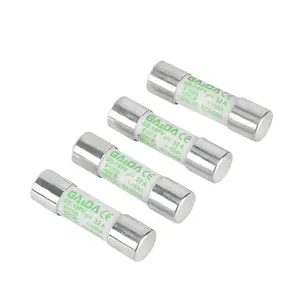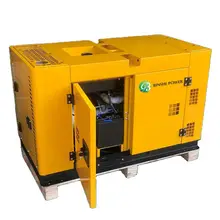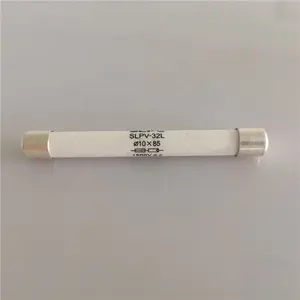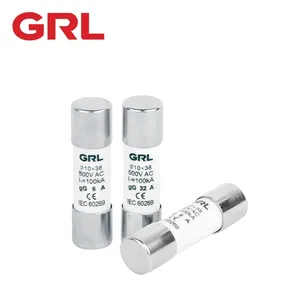A solar panel fuse is a critical safety device in any solar power system. It is designed to protect the solar panels, wiring, and other electrical components from overcurrent, which can cause damage or even fire. A solar panel fuse acts as a sacrificial device that breaks the circuit if the current flowing through it exceeds a predetermined level, ensuring the safety and longevity of the solar power system.
Types and Functions of Solar Panel Fuses
The variety of solar panel fuses includes solar panel fuse boxes, inline fuses, and dc fuse boxes for solar applications. Each type serves a specific function within the system. A solar panel fuse box houses multiple fuses and acts as a central protection point, while an inline fuse is often used for individual solar panel protection. The DC fuse box solar variant is tailored for direct current applications, which is the type of current produced by solar panels. For instance, a Renogy inline fuse is designed for easy integration into existing solar setups, providing overcurrent protection with minimal installation effort. Caravan solar panel fuses are another specialized type, designed to withstand the vibrations and temperature variations associated with mobile installations.
Structure and Installation of Solar Panel Fuses
The structure of a solar panel fuse typically includes a fuse link housed within a solar panel fuse holder or box. Installation requires careful consideration of the solar panel fuse location and the size of the fuse, which should match the system's requirements. The fuse between solar panel and MPPT (Maximum Power Point Tracker) or charge controller is particularly important as it protects the system's core components. The physical components of a fuse system include the base, which secures the fuse in place, the cap, which provides the connection point for the circuit, and the fusible link itself, which is the part that melts under excessive current. The operation of these components is straightforward: the current flows through the fusible link, and if the current exceeds the rated capacity of the fuse, the link melts, opening the circuit and preventing the flow of electricity.
Materials and Safety Standards of Solar Fuses
Solar PV fuses are made from materials capable of withstanding high temperatures and electrical stress. For example, ceramic is often used in the construction of fuses due to its excellent thermal and electrical insulating properties. Metals like silver or copper are used for the fusible link because of their high electrical conductivity and low melting points, which allow for precise operation during overcurrent events. Safety standards such as IEC and CSA are followed to ensure that these components can reliably break the circuit under fault conditions without causing additional hazards. The color of the fuse, typically white or black, is chosen to match the aesthetics or design of the solar power system, but also to provide clear visibility for inspection and maintenance purposes.
Business Usages and Applications
Businesses utilize solar panel fuses in various applications ranging from small-scale solar PV systems to large PV systems in commercial and industrial settings. The fuse box for solar systems is an essential component in these installations, ensuring that all connected devices are protected from potential electrical hazards. In the telecommunications industry, for example, solar fuses are used to protect the power supply of remote transmitters. In agricultural settings, solar-powered irrigation systems rely on fuses to prevent damage to pumps and control units. These fuses create business value by preventing downtime and equipment failure, thereby helping to maintain continuous operations and protect investments in solar technology.
Functions of Solar Panel Fuses
The primary function of a solar panel fuse is to provide overcurrent protection. This means that the fuse is designed to interrupt the power supply when the current exceeds safe levels, thereby preventing damage to the solar panels and other components in the electrical circuit. Additionally, fuses are used to isolate parts of the solar power system for maintenance or repair, ensuring the safety of personnel working on the system.
Features of Solar Panel Fuses
The distinct characteristics or capabilities of solar panel fuses include their rated current and voltage, which determine the maximum electrical load they can safely interrupt. Unique selling points that set them apart from competitors include specialized designs like the jjn solar panels fuses, which are known for their robust construction and reliable performance in a variety of environmental conditions. Another feature is the ease of installation and replacement, with some fuses designed for tool-free maintenance, which is a significant advantage in remote or difficult-to-access installations.
Benefits of Solar Panel Fuses
The use of solar panel fuses solves the problem of potential overcurrent damage in solar power systems. They meet the need for reliable safety devices that can operate autonomously and with precision. Positive outcomes include the protection of expensive solar equipment from damage, reduced risk of fire, and compliance with electrical safety codes, which can lead to lower insurance costs and increased trust from stakeholders.
How to Choose and Use Solar Panel Fuses
Choosing the right solar panel fuse involves considering the maximum current your solar system will produce and the voltage it operates at. The fuse size for solar panels should be based on these parameters, with a safety margin included. It is also essential to select a fuse that complies with the relevant safety standards for your region. To use a solar panel fuse effectively, it should be installed in a location where it can be easily accessed for inspection and replacement. It should also be clearly labeled to facilitate maintenance and troubleshooting.
How to Maintain and Replace Solar Panel Fuses
Maintenance of a solar panel fuse is minimal, but regular inspection is recommended to ensure they are in good condition. Replacing a solar panel fuse is straightforward: once the correct fuse size for solar panels is determined, it can be installed in the solar panel fuse holder with the system de-energized for safety. It is advisable to follow the manufacturer's guidelines for both maintenance and replacement to ensure optimal performance and safety.
What are the key considerations when installing a solar panel fuse?
When installing a solar panel fuse, key considerations include the electrical specifications of the solar system, the correct fuse size for solar panels, and the appropriate solar panel fuse location for optimal protection. It is also crucial to ensure that the installation is carried out in accordance with electrical codes and standards.
How can one ensure the solar panel fuse meets the system requirements?
To ensure a solar panel fuse meets the system requirements, one must understand the system's maximum voltage and current output. The chosen fuse must match these specifications and be rated for the correct voltage and current, following the safety standard guidelines such as IEC or CSA.
What are the best practices for solar panel fuse maintenance?
Best practices for solar panel fuse maintenance include regular inspections to check for signs of damage or corrosion, ensuring the fuse connections are tight and secure, and replacing any fuses that show signs of wear or have operated due to an overcurrent event. It is also advisable to keep a record of maintenance activities for future reference.











































 浙公网安备 33010002000092号
浙公网安备 33010002000092号 浙B2-20120091-4
浙B2-20120091-4